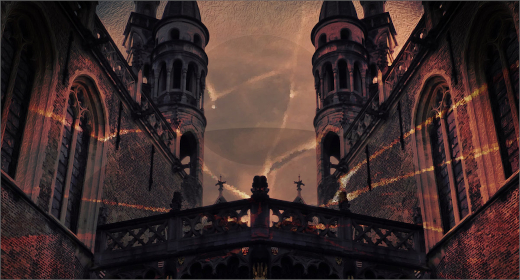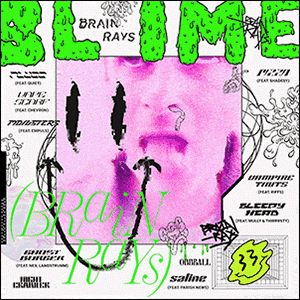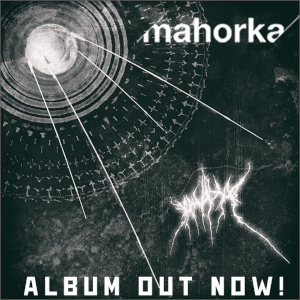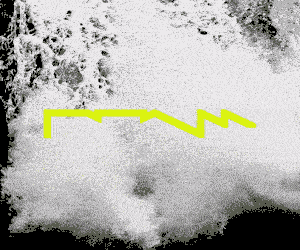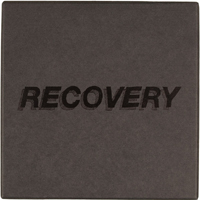
(11.11.08) Every so often, just when you are beginning to wonder whether the genre you love has had its day, somebody or something comes along to restore your faith. In this instance, the “somebody” is Fractured Recordings and the “something” is their luxurious boxset of 10 seven inch singles entitled Recovery.
The whole concept behind this project, Fractured Recordings’ first foray into the experimental electronic music scene, is to call on the talents of a list of 20 respected electronic music experimentalists to cover a classic track with special meaning to them. Contributions range from straight covers, to tributes and complete reinterpretations. Even the labels on each of the singles are drawn reinterpretations of the original designs mixed the drawn logos of the artist contributing the rework. Each single comes in a generic white Recovery sleeve with the grooves of a vinyl single drawn around the centre cut-out. The whole set is carefully put together and presented with understated chic.
The list of contributing artists is as impressive as the tracks they have chosen to cover, throwing up the occasional surprise amongst the tracks chosen. A whole range of weird and wonderful artists such as Joy Division, New Order, Wings, A-ha, Kate Bush, Pink Floyd, Wham, Michael Jackson, David Bowie and OMD are covered by the likes of BJ Nilsen, Fennesz, :Zoviet*France, Ryoji Ikeda, Mika Vanio, Alva Noto, Matmos, snd and JG Thirlwell to name just a few.
Starting out with two completely contrasting tracks; BJ Nilsen’s brisk but hardly recognisable electronic take on the Joy Division track “Heart and Soul” is slick and suitably destructive while the B-side, PLU and Ergo Phizmiz’s version of Wings’ “Mull of Kintyre” is slightly more in keeping with the original although more shambolic and disjointed with multi-tracked vocals and an increasingly detuned country blues feel. Christian Fennesz turns A-ha’s “Hunting High and Low” into a seething mass of rumbling ethereal drones and hailstorm tip-taps over elements of the original while :Zoviet*France rework Motorhead’s “Bomber” in a similar way with discrete low drones and subtly intertwining electronic tones under simple analogue melodies. Things get slightly odd with Ryoji Ikeda’s broken re-version of AC/DC’s “Back in Black” which appears to be constructed from very small snippets of electronic noise reconstructed into a tribute to the band. Mika Vanio’s homage to Kate Bush’s “Running up That Hill” is less fractured, entirely more melodic (before the cutting electric guitar appears) and possesses a similar feel to the original albeit entirely darker and more atmospheric. The fourth single sees Robert Henke transform the Alan Parson’s Project song “Lucifer” into a shimmering cascade of flowing layered drones, chimes and undulating choral textures while Susan Stenger’s take on The Knack’s classic “My Sharona” slows it right down, adding a low humming guitar drone and slowly building the recognisable tune with an unexpected medieval slant.
What becomes clear after the first few singles is how Fractured’s attention to detail stretches to the choice of tracks paired in each case. In a majority of cases the tracks on each side of a single will be stylistically similar and share some form of commonality with their take of a popular track. This helps lend some further cohesion between the singles and suggests some thought was put into which tracks would appear with which others, something which is not always apparent with other compilations.
The reworks that are probably closest to the original tracks be found on the sixth single; Jenny Hoysten’s Paradise Island’s cover of Buffy St Marie’s “Dream Tree” is a straight acoustic cover whereas the flipside, Alva Noto’s restyling of Afrika Bambaataa’s “Planet Rock” is an instrumental electronic realisation of a landmark track that Carsten Nicolai – the man behind Alva Noto – sees as continuing the exchange of ideas instigated by Bambaataa when he sampled Kraftwerk for the original. Matmos also keep fairly true to the original with their cover of Bowwowwow’s “C30, C60, C90, Go!,” retaining the familiar tribal drums, re-recording the chorus line and adding their own strange experimental electronic flourishes. On the flip, Barbara Morgenstern stays even truer to the original when she contributes a sweet, simple and jaunty electronic cover of New Order’s early track “Temptation” featuring her own trademark vocal stylings. Next up is a cover of Pink Floyd’s “Lucifer Sam” by Throbbing Gristle members and long-time electronic experimentalists Chris & Cosey (Chris Carter and Cosey Fanni Tutti). Their version of the track features Cosey’s suitably trippy almost spoken vocals and a shifting backdrop of slowly pulsing guitar, low drones and horror movie chimes that sit together perfectly to create a unsettling backdrop. Perhaps slightly strangely at first glance, this is paired with Robbert Lippok’s recreation of Wham’s “Freedom! ’90” featuring Caroline Thorpe. All becomes clear when the track starts; like Chris & Cosey’s track, “Freedom! ’90” features half spoken, half sung lyrics that sound like a completely different song courtesy of Thorpe’s vocal rework and Lippok’s busy, bubbling yet sparkling electronic overhaul. A true reinterpretation in every way that could easily be taken as a completely new track it is so well conceived.
Snd’s choice of track is the instantly recognisable mega-hit “Billie Jean” by Michael Jackson that they transform into a jittery pop-glitch rehash with random looped stop-start beats and other disjointed electronic weirdness, none of which really resembles the original. Richard Chartier & CoH (Ivan Pavlov) tackle the obscure Soft Cell track “Bleak is My Favourite Cliché,” utilising suitably depressing layered lyrics and a steady electro track that builds the tension and anxiety levels beautifully. Promising to be equally off the wall is Momus’ take on “Ashes to Ashes” by David Bowie and he doesn’t disappoint. Featuring the original lyrics and a faithful rendition of the original tune it is augmented with all manner of tumbling breaks, weird electronic blips and is generally deconstructed and fractured. Equally fractured and beaten is 10cc’s “Damn Love” reworked by mischievous sound terrorist Donna Summer (aka Jason Forrest). He takes the original track and basically messes with it, cutting it up, giving it a 70’s vs 00’s overhaul, ripping it up and reassembling it in his own chaotic style; and it sounds like he had great fun doing it. Perhaps the most disturbing track of the whole collection is J G Thirlwell’s way over the top re-version of The Normal’s “Warm Leatherette.” Something like a cross between an overly dramatic 70’s TV thriller soundtrack vs classic 80’s horror movie theme vs 50’s sci-fi sound effects with big orchestral drums and Thirlwell’s frankly disturbing vocal delivery, it is big, extravagant and gloriously excessive. Closing the set is a gorgeously lush orchestral version of OMD’s “Souvenir” by Johann Johannsson featuring swathes of strings positively cascading through the air and backed by choral tones to finish the set off in the grandest imaginable way. A truly spectacular and fitting way to close such an ambitious project featuring a unique set of tracks.
Fractured Recordings specialise in one-off editions and artists’ projects. Recovery is released in a numbered edition of just 500 copies although the price tag may deter some from buying. It is however a unique project that collects a series of unique tracks from a long list of respected artists known for their willingness to experiment with and push the boundaries of their music. Where else are you going to hear these artists covering classic tracks like these? A lot of fun and a unique and interesting curio too. A spectacular debut for Fractured Recordings, let’s hope they can maintain this level of quality in the future. They have set the bar high that is for sure.
Recovery is out now on Fractured.










